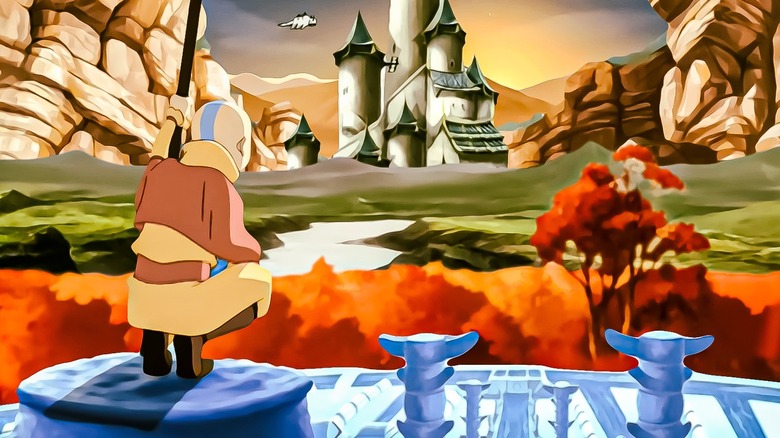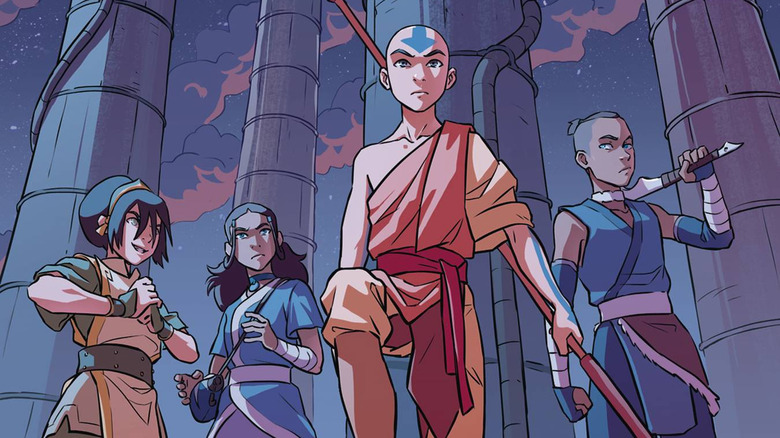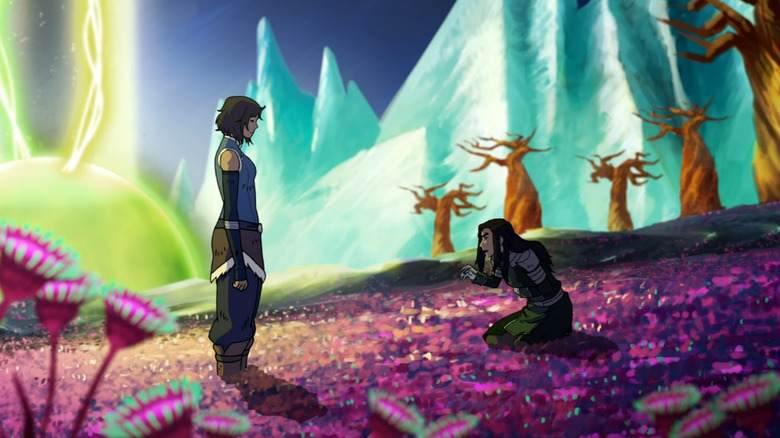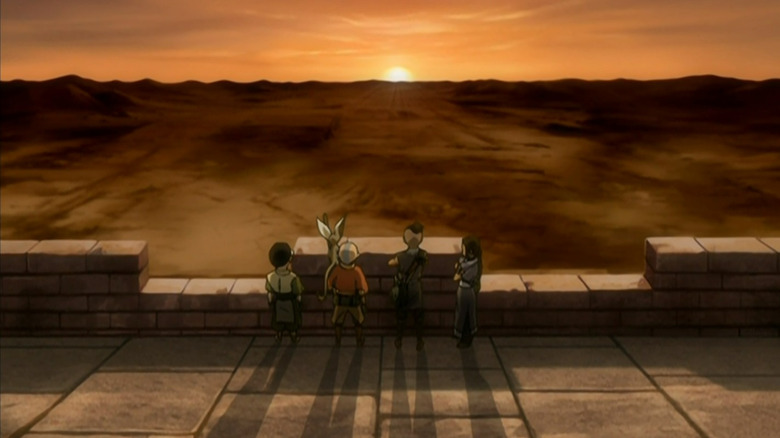Avatar: The Last Airbender Expanding Into An Infinite MCU-Style Universe Betrays The Original Series
The existence of Avatar Studios is scary. Maybe not "Michael Dante DiMartino and Bryan Konieztko have left Netflix's live-action adaptation of their original animated series over artistic disagreements"-level scary, for sure, but it's still a reason for concern.
For those who might not know, Avatar Studios is a production company within Nickelodeon, created for the sole purposes of expanding the world first seen in "The Last Airbender." In theory, it's an incredible idea. Who doesn't love "TLA?" The stylized animation is gorgeous, somehow still holding up two decades later, the writing is an immaculate blend of silliness and substance, and the ending brought everything that came before together in a meaningful, unforgettable way.
Sure, "TLA" has flaws but they are hilariously outweighed by the quality of what is often considered the greatest animated series of the modern age. And that's why Avatar Studios is scary. Its very existence gambles with the narrative quality of something beautifully finite. By funding a studio to keep "TLA" alive forever, Nickelodeon ensured that, eventually, the community will want to see it die. Think about it like this — in 2023, there's not a single cinematic universe that's on full speaking terms with its audience. Marvel fans are fresh off the disappointment that was "Ant-Man and the Wasp: Quantumania" and DC fans are ...well, they've had more than their fair share of trauma, haven't they?
What makes Avatar Studios so different than Marvel Studios or the newly refurbished DC Studios? Ultimately, time. DiMartino and Konietzko's studio has yet to release anything, so any concern over quality is purely hypothetical. So, let's play with some hypotheticals.
Approaching the future of Avatar Studios with an honest appraisal of the past
Before going too much further, it would be ignorant to pretend as though Avatar Studios is encroaching on otherwise untouched territory. The truth is that we've never lived in a world where "Avatar" ended with "The Last Airbender." Released partially in tandem with the original animated series was a collection of comic strips which have since been anthologized in the Dark Horse publication "Avatar: The Last Airbender – The Lost Adventures." These function sort of like deleted scenes, snippets that occur between episodes or just off-screen.
And, of course, Dark Horse is the publisher behind a slew of other "Avatar" graphic novels, including "The Search" and "The Promise," which bridge some of the narrative gap between "TLA" and "The Legend of Korra." Some, like "Turf Wars" and "Pattern in Time," even go beyond the events depicted in the sequel series (don't worry, we'll come back to Korra in a minute). Also, written by F. C. Yee, there is a series of novels entitled "The Chronicles of the Avatar" which, as of this writing, share the origin stories for Avatar Kyoshi and Avatar Yangchen.
Wait, we're not done yet! There's "Avatar Arena," an online fighting game set before the Hundred Year War, and "Avatar: Legends: The Roleplaying Game," whose purpose is literally in the title. The world of "Avatar" is already this massive, sprawling thing, with most of its ancillary media considered canon (for now). Obviously, some of this stuff is more ancillary than others but the point remains — no concern can be levied at the potential narrative strain brought upon by an expanding universe without acknowledging where the franchise is in the present tense.
Korra's divisive legacy shouldn't be compared to Avatar Studios' potential consequences
We've put it off for long enough: let's talk about Korra. Unlike other additions to the current canon, "The Legend of Korra" is on equal, concrete footing with "The Last Airbender." They share the same media format and even some of the same voice actors, wherever applicable. Korra's tenure as the Avatar is a direct continuation of the core narrative and is the largest expansion to the story since Aang's inaugural series. Despite its divisiveness, "Legend of Korra" doesn't deserve to be viewed beneath the same lens of potential damage as the upcoming productions from Avatar Studios.
There are legitimate reasons to criticize "Korra." The four seasons are notably disconnected, character development reverts back to square one every time the writers need to fabricate conflict, and it's littered with some of the YA genre's most egregious tropes. But "Korra" fought to stand on its own feet. It offered engaging antagonists, it permitted a well realized protagonist to make compelling mistakes, and it even showcased a fascinating and natural progression to the technological worldbuilding that "TLA" planted the seeds for so many years ago.
The reason that "Korra" can't be lumped in with Avatar Studios is because it existed before Avatar Studios. That's an important distinction to make, because "Korra" is only one step forward in the canon, while Avatar Studios is the potential promise of many steps in many directions for as long as the franchise is profitable. Could it be considered a bridge that led to Avatar Studios? Sure, but even that's not the same thing.
Avatar Studios deserves a fair chance -- for now, at least
Together, Michael Dante DiMartino and Bryan Konietzko are an artistic powerhouse. There's a very real chance that, under their leadership, Avatar Studios will produce a number of quality stories which sate the public's thirst for years to come. And they're not just creative, they're smart, too. The slate for Avatar Studios' first batch of projects features fan favorite characters like Zuko and Kyoshi starring in their own standalone adventures. Wrap all this in socially explosive context of how the duo departed Netflix's now doomed adaptation of their work and you've got a recipe for success. At the beginning, at least.
Howver, audiences are tiring of the cinematic universe model. When every story is shared with the understanding that another story will follow, and then another, and then another ... each individual piece loses some of its identity, some of its value. As a cinematic universe expands, so does its barrier to entry. In 2023, anyone new to Marvel needs to watch over 30 movies and 10 TV shows just to catch up. Those numbers will only grow as times marches onward. It's exhausting, even if there are genuinely enjoyable stories buried in the fold. The idea of experiencing that same fatigue with something as precious as "Avatar" is ... devastating.
A story matters, in no small part, because it ends. "The Last Airbender" ended and it ended well. Even "The Legend of Korra" successfully wrapped up most of its narrative threads in a meaningful way. It's not that Avatar Studios is this villainous or destructive thing, rather that its existence says the quiet part out loud. It's almost inevitable that telling a good story will matter less than having a story to tell at all.



